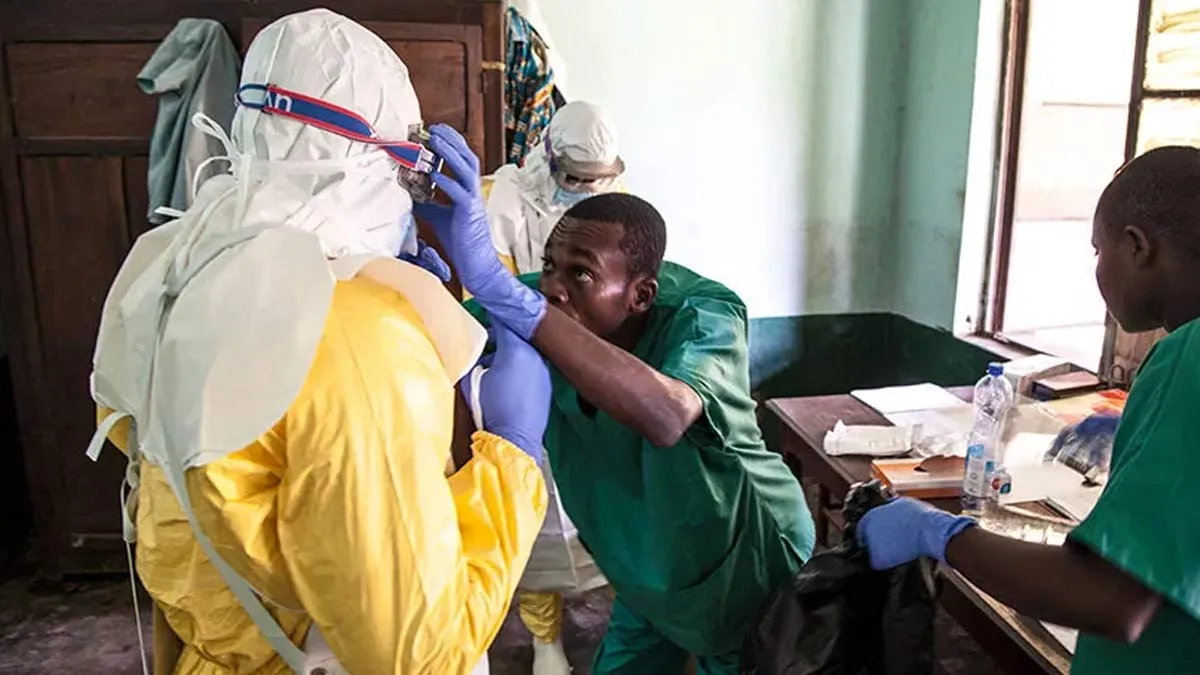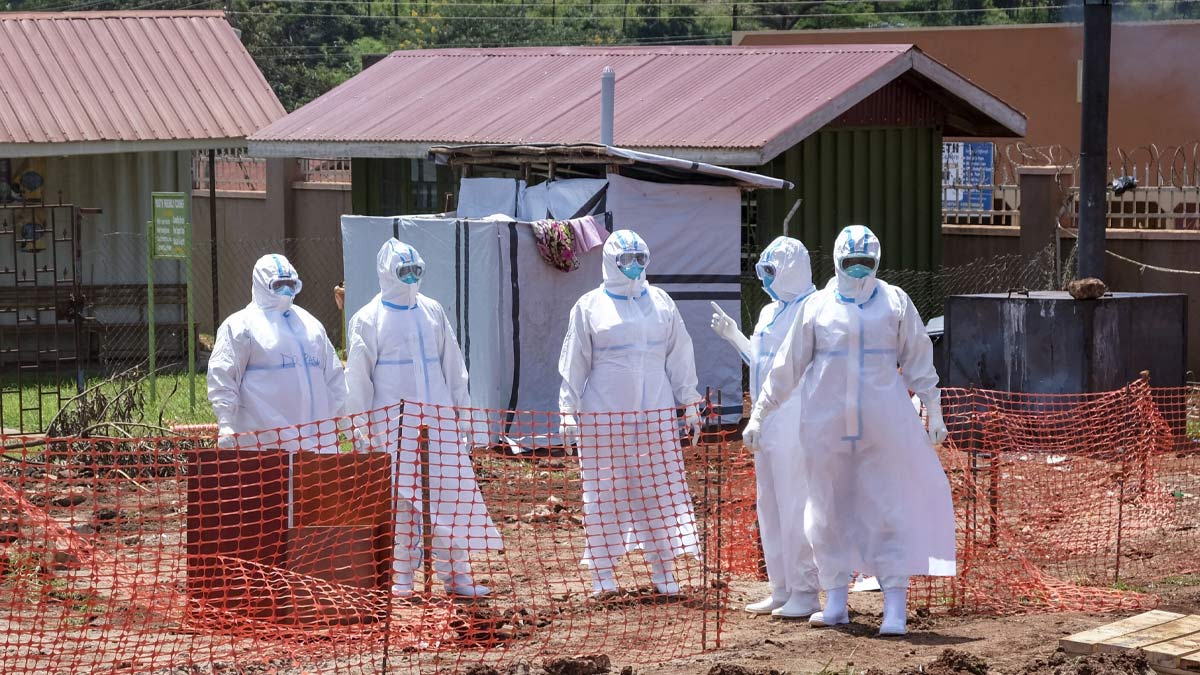
Uganda is grappling with a fresh Ebola outbreak, sparking concerns among health officials as the deadly virus claims its first victim in the capital, Kampala. With no approved vaccine for the Sudan strain of Ebola—the variant responsible for this outbreak—authorities are racing against time to contain the spread. In response, health officials are preparing to roll out a trial vaccine in a bid to curb the outbreak before it escalates into a full-blown crisis.
Table of Content:-
Urgent Vaccine Trials to Combat the Sudan Strain
Pontiano Kaleebu, the executive director of the Uganda Virus Research Institute, confirmed that over 2,000 doses of a candidate vaccine have been fast-tracked for use against the Sudan strain of Ebola. However, he emphasised that this vaccine is still in the trial phase and has not yet been licensed for widespread use.
"The protocol is being accelerated to get all the necessary regulatory approvals," Kaleebu stated, adding that research teams are working closely with surveillance units to prepare for the vaccine rollout. The World Health Organization (WHO) has already stepped in to support Uganda’s response by providing 2,160 doses of the trial vaccine. WHO’s rapid involvement underscores the urgency of the situation, as experts fear the virus could quickly spread if not contained.

Why Is the Vaccine Trial Crucial?
Unlike other strains of Ebola, such as the Zaire strain, the Sudan strain does not yet have an approved vaccine. This makes controlling the outbreak significantly more challenging. Uganda previously gained access to trial vaccines during a 2022 Ebola outbreak, which resulted in at least 55 deaths. However, since the outbreak ended within four months, health officials were unable to conduct a full-scale vaccine study.
Past experience has shown that vaccines can play a pivotal role in controlling Ebola outbreaks. For example, during the 2018–2020 Ebola crisis in the Democratic Republic of Congo, over 3,000 high-risk individuals were vaccinated with rVSV-ZEBOV, an approved vaccine for the Zaire strain. The effort was instrumental in bringing the outbreak under control.
Also Read: UK On High Alert As ‘Mystery Virus’ HMPV Surges, NHS Issues Urgent Health Warning
Contact Tracing to Prevent Further Spread
Uganda’s Ministry of Health has identified at least 44 individuals who had close contact with the infected nurse before she succumbed to the virus. Among them are 30 healthcare workers and several patients.
Contact tracing is a critical measure in containing Ebola, as the virus spreads through direct contact with bodily fluids of infected individuals or contaminated surfaces. Symptoms of the disease include fever, vomiting, diarrhoea, severe muscle pain, and in some cases, internal or external bleeding. Authorities are working tirelessly to monitor and isolate those exposed to the virus in an attempt to prevent further infections.

East Africa Faces Rising Threat of Hemorrhagic Fevers
Uganda’s Ebola outbreak is not an isolated incident; rather, it is part of a concerning trend of viral hemorrhagic fevers in East Africa. Tanzania recently reported an outbreak of Marburg virus, a deadly disease similar to Ebola, which has already claimed at least two lives. Rwanda also faced a Marburg outbreak in December, which was later contained.
With multiple countries in the region facing outbreaks of these highly infectious diseases, global health agencies are on high alert, closely monitoring the situation.
Also Read: Kansas Faces Largest Tuberculosis Outbreak in US History; CDC Refutes Claims
Challenges in Containing the Outbreak in Kampala
Containing the Ebola outbreak in Uganda’s capital presents a daunting challenge due to its dense population of nearly four million people. Unlike previous outbreaks in remote villages, Kampala’s urban setting increases the risk of rapid transmission.
The infected nurse had visited multiple hospitals before receiving a confirmed diagnosis. She had also traveled to Mbale, a city in eastern Uganda, and sought treatment from a traditional healer, raising concerns about potential secondary infections. Authorities are now working to trace her movements and identify anyone who may have been exposed. The window to contain the outbreak is narrowing, making the upcoming vaccine trial a crucial tool in fighting the virus.
Ebola: A Deadly Threat with No Definitive Cure
Ebola was first identified in 1976, with simultaneous outbreaks in South Sudan and the Democratic Republic of Congo. The virus is named after the Ebola River, near where one of the first outbreaks occurred. Scientists believe the virus originates from infected animals, likely bats or primates, and spreads to humans through direct contact. Consuming raw or undercooked meat from infected animals is another potential transmission route.
Uganda has a history of Ebola outbreaks, including a devastating one in 2000 that resulted in hundreds of deaths. However, the deadliest Ebola crisis occurred between 2014 and 2016 in West Africa, where over 11,000 people lost their lives.
Bottomline
With no approved vaccine for the Sudan strain, Ugandan authorities are racing against time to contain the outbreak before it spirals out of control. The success of the upcoming trial vaccine could prove to be a game-changer, not only for Uganda but for global efforts to combat future Ebola outbreaks.
For now, health officials are urging the public to remain vigilant, report symptoms early, and follow safety protocols to minimise the risk of further transmission. The world is watching closely, hoping that Uganda’s swift action will help avert another deadly epidemic.
Also watch this video
How we keep this article up to date:
We work with experts and keep a close eye on the latest in health and wellness. Whenever there is a new research or helpful information, we update our articles with accurate and useful advice.
Current Version